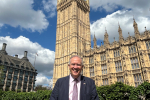MP votes to send message to House of Lords
Yesterday the Holocaust Memorial Bill had its Second Reading. The Bill will enable the construction of the national Holocaust Memorial in Victoria Tower Gardens, a small park next to the Palace of Westminster. Parliament needs to pass this legislation because an Act from 1900 prevents the use of the land for any other use than as a public park.
John Baron MP supports the principle of a national Holocaust Memorial, but voted for an amendment tabled by the Father of the House, Sir Peter Bottomley MP, which would enable further scrutiny of the decision to site the memorial in Victoria Tower Gardens. In the subsequent votes, the amendment was defeated by 379 votes to 11.
John said,
“There is no disagreement that there should be a national memorial to the Holocaust, so that future generations can learn from these terrible events. However, I question whether due process and proper consultation was followed.”
“A key concern is the lack of consultation and discussion as to its location, following the Government overruling Westminster Council’s refusal to grant planning permission. We were debating this Bill yesterday only because those pushing for siting the memorial in Victoria Tower Gardens were told by a High Court judge that they could not ride roughshod over a previous Act of Parliament which said the gardens should be preserved for permanent use as a public park. Since then there has been little attempt by the Government to engage.”
“I believe a decision has been made to proceed at the very heart of government, and nothing is going to get in the way. This is not how we do things in this country. We believe in due process and transparency, which would have avoided this controversy and encouraged greater cohesion and understanding of what is needed and where.”
“Those of us who realise the Government was going to win the vote on Second Reading by a big margin therefore focused on sending a clear message to the House of Lords in a subsequent vote that further scrutiny and flexibility was required by the Select Committee which follows.”
